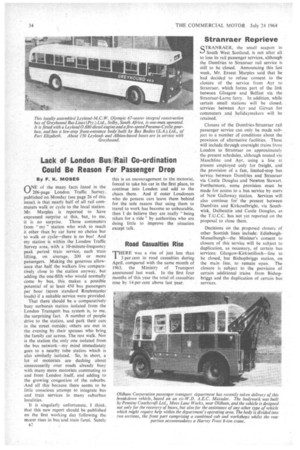Lack of London Bus/Rail Co-ordination Could Be Reason For Passenger Drop
Page 36

If you've noticed an error in this article please click here to report it so we can fix it.
• By F. K. MOSES
.Q rINE of the many facts listed in the NE London Traffic Survey. published on Monday (see page 26 of this issue), is that nearly half of all rail commuters walk or cycle to the local station. Mr. Marples is reported to have expressed surprise at this, but, to me, it is no surprise. Those commuters from " my " station who wish to reach it other than by car have no choice but to walk or cycle—there is no bus! And my station is within the London Traffic Survey area, with a 10-minute-frequency peak period train service, each train lifting, on average. 200 or more passengers. Making the generous allowance that half the walkers live comparatively close to the station anyway, but adding the one-fifth who would normally come by bus, this. makes -a possible potential of at least 450 bus passengers per hour (seven standard Routemaster loads) if a suitable service were provided. That there should be a comparatively busy surburan station isolated from the London Transport bus system is, to me, the surprising fact. A number of people drive to the station, and park their cars in the street outside; others are met in the evening by their spouses who bring the family car across. The rest walk. Nor is the station the only one isolated from the bus network—my mind immediately goes to a nearby tube station which is also similarly isolated. So, in short, a lot of motorists are dashing about unnecessarily over roads already busy with many more motorists commuting to and from London itself, and adding to the growing congestion of the suburbs. And all this because there seems to be little conscious attempt to integrate bus and train services in many suburban localities.
It is singularly unfortunate, I think. that this new report should be published on the first working day following the recent rises in bus -and train fare.§. Surely
B2
this is an encouragement to the motorist, forced to take his car in the first place, to continue into London and add to the chaos there. And if outer Londoners who do possess cars leave them behind for the sole reason that using them to travel to work has become so unbearable. then I do believe they are really "being taken for a ride" by authorities who are doing little to improve the situation except talk.
Road Casualties Rise
THERE was a rise of just less than I 3 per cent in road casualties during April. compared with the same month of 1963, the Ministry of Transport announced last week. In the first four months of this year the total of casualties rose by 14 per cent above last year.
Stranraer Reprieve
QTRANRAER, the small seaport in P.-, South West Scotland, is not after all to lose its rail passenger services, although the Dumfries to Stranraer rail service is stilt to be closed. ,Announcing this last week, Mr. Ernest Marples said that he had decided to refuse consent to the closure of the service from Ayr to Stranraer, which forms part of the link between Glasgow and Belfast via the Stranraer-Larne ferry, In addition, while certain small stations will be closed, services between Ayr and Girvan for commuters and holidaymakers will be retained.
Closure of the Domfries-Stranraer rail passenger service can only be made subject to a number of conditions about the provision of alternative facilities, These will include through overnight trains from London to Stranraer on approximately the present schedules, although routed via Mauchline and Ayr, using a line at present employed only for freight, and the provision of a fast, limited-stop bus Service between Dumfries and Stranraer via Castle Douglas and Newton Stewart. Furthermore, some provision must be made for access to a bus service by users of New Galloway station. Services will also continue for the present between Dumfries and Kirkcudbright, via Southwick, Dalbeattie and Castle Douglas, as the T.U.C.C. has not yet reported on the proposal to close them. .
Decisions on the proposed closure of other Scottish lines include: EdinburghMusselburgh--the Minister's consent to closure of this service will be subject to duplication, as necessary, of certain bus services; Glasgow-Kirkintilloch—line to be closed, but Bishopbriggs station, on the main line, to remain open. The closure is subject to the provision of certain additional trains from Bishopbriggs and the duplication of certain bus. services.
















































































































